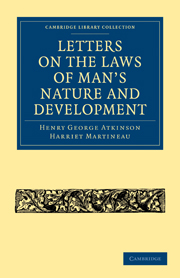Book contents
- Frontmatter
- Preface
- Mottoes
- Contents
- Letter. 1 Inquiry for a Basis
- Letter. 2 Proposal of a Basis
- Letter. 3 Preparation of the Ground
- Letter. 4 What is the Brain?
- Letter. 5 Inquiry about its Structure
- Letter. 6 Early days of Phrenology
- Letter. 7 Inquiry for New Discoveries
- Letter. 8 Methods of New Discovery. Organic Arrangement of the Brain
- Letter. 9 Illustrative Cases
- Letter. 10 Organic Arrangement of the Cerebrum
- Letter. 11 Dr. Howe's Report on Idiocy
- Letter. 12 The Senses and Nervous System
- Letter. 13 Illustrative Comment
- Letter. 14 Facts about the Senses under various conditions
- Letter. 15 Raising questions
- Letter. 16 Bacon, on Matter and Causation. Inferences and Dreams. Association of Ideas
- Letter. 17 Nothing
- Letter. 18 Knowledge and Notions. Results of each
- Letter. 19 Release from Notions. Entrance upon Knowledge
- Letter. 20 Natural History of Superstition
- Letter. 21 Theology and Science
- Letter. 22 Central Law and Pervasive Unity. Light. Sense of Identity. Ghost-seeing. Unrevealed Human Relations
- Letter. 23 Position and Privilege of Truth-seekers
- Letter. 24 Position and Privilege of Truth-speakers
- Appendix
Letter. 24 - Position and Privilege of Truth-speakers
Published online by Cambridge University Press: 29 August 2010
- Frontmatter
- Preface
- Mottoes
- Contents
- Letter. 1 Inquiry for a Basis
- Letter. 2 Proposal of a Basis
- Letter. 3 Preparation of the Ground
- Letter. 4 What is the Brain?
- Letter. 5 Inquiry about its Structure
- Letter. 6 Early days of Phrenology
- Letter. 7 Inquiry for New Discoveries
- Letter. 8 Methods of New Discovery. Organic Arrangement of the Brain
- Letter. 9 Illustrative Cases
- Letter. 10 Organic Arrangement of the Cerebrum
- Letter. 11 Dr. Howe's Report on Idiocy
- Letter. 12 The Senses and Nervous System
- Letter. 13 Illustrative Comment
- Letter. 14 Facts about the Senses under various conditions
- Letter. 15 Raising questions
- Letter. 16 Bacon, on Matter and Causation. Inferences and Dreams. Association of Ideas
- Letter. 17 Nothing
- Letter. 18 Knowledge and Notions. Results of each
- Letter. 19 Release from Notions. Entrance upon Knowledge
- Letter. 20 Natural History of Superstition
- Letter. 21 Theology and Science
- Letter. 22 Central Law and Pervasive Unity. Light. Sense of Identity. Ghost-seeing. Unrevealed Human Relations
- Letter. 23 Position and Privilege of Truth-seekers
- Letter. 24 Position and Privilege of Truth-speakers
- Appendix
Summary
H. G. A. to H. M.
It seems to me there are three principal fundamental forms of the moral life; namely—active humanity, industry in acquiring knowledge, and honesty in imparting what we know.—It is one of the highest duties of Man to learn to know himself; and, secondly, to allow himself to be known—but the contending and false systems of the world are a great hindrance to simplicity of character and moral growth.—The mathematician, the linguist, the geologist, the chemist, may be very wise in those matters which they have studied, but very bad moralists, and wholly incompetent to govern and educate men. The power to govern is in the knowledge of the nature of the thing governed. The mathematician may be a very bad reasoner on physiological matters, and the linguist no wiser for the ability to utter the same idea in several languages. If you would regulate your clock, you apply to the clockmaker; if you would regulate a steam-engine, you apply to the engineer: if you would cure a disease, you send for the physician: but if you would develope Man's nature, and learn how to regulate his conduct, both as an individual and as a member of society, would you send to Cambridge for a mathematician, or to Oxford for a linguist, or apply to the clockmaker or the village doctor?—“Man knows no more than he has observed:” but whose profession is it to observe the laws of Man's nature and development?
- Type
- Chapter
- Information
- Letters on the Laws of Man's Nature and Development , pp. 286 - 292Publisher: Cambridge University PressPrint publication year: 2009First published in: 1851



